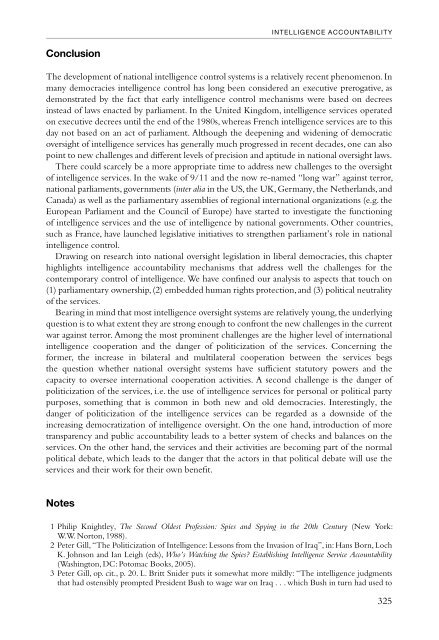Handbook of intelligence studies / edited by
Handbook of intelligence studies / edited by
Handbook of intelligence studies / edited by
You also want an ePaper? Increase the reach of your titles
YUMPU automatically turns print PDFs into web optimized ePapers that Google loves.
Conclusion<br />
The development <strong>of</strong> national <strong>intelligence</strong> control systems is a relatively recent phenomenon. In<br />
many democracies <strong>intelligence</strong> control has long been considered an executive prerogative, as<br />
demonstrated <strong>by</strong> the fact that early <strong>intelligence</strong> control mechanisms were based on decrees<br />
instead <strong>of</strong> laws enacted <strong>by</strong> parliament. In the United Kingdom, <strong>intelligence</strong> services operated<br />
on executive decrees until the end <strong>of</strong> the 1980s, whereas French <strong>intelligence</strong> services are to this<br />
day not based on an act <strong>of</strong> parliament. Although the deepening and widening <strong>of</strong> democratic<br />
oversight <strong>of</strong> <strong>intelligence</strong> services has generally much progressed in recent decades, one can also<br />
point to new challenges and different levels <strong>of</strong> precision and aptitude in national oversight laws.<br />
There could scarcely be a more appropriate time to address new challenges to the oversight<br />
<strong>of</strong> <strong>intelligence</strong> services. In the wake <strong>of</strong> 9/11 and the now re-named “long war” against terror,<br />
national parliaments, governments (inter alia in the US, the UK, Germany, the Netherlands, and<br />
Canada) as well as the parliamentary assemblies <strong>of</strong> regional international organizations (e.g. the<br />
European Parliament and the Council <strong>of</strong> Europe) have started to investigate the functioning<br />
<strong>of</strong> <strong>intelligence</strong> services and the use <strong>of</strong> <strong>intelligence</strong> <strong>by</strong> national governments. Other countries,<br />
such as France, have launched legislative initiatives to strengthen parliament’s role in national<br />
<strong>intelligence</strong> control.<br />
Drawing on research into national oversight legislation in liberal democracies, this chapter<br />
highlights <strong>intelligence</strong> accountability mechanisms that address well the challenges for the<br />
contemporary control <strong>of</strong> <strong>intelligence</strong>. We have confined our analysis to aspects that touch on<br />
(1) parliamentary ownership, (2) embedded human rights protection, and (3) political neutrality<br />
<strong>of</strong> the services.<br />
Bearing in mind that most <strong>intelligence</strong> oversight systems are relatively young, the underlying<br />
question is to what extent they are strong enough to confront the new challenges in the current<br />
war against terror. Among the most prominent challenges are the higher level <strong>of</strong> international<br />
<strong>intelligence</strong> cooperation and the danger <strong>of</strong> politicization <strong>of</strong> the services. Concerning the<br />
former, the increase in bilateral and multilateral cooperation between the services begs<br />
the question whether national oversight systems have sufficient statutory powers and the<br />
capacity to oversee international cooperation activities. A second challenge is the danger <strong>of</strong><br />
politicization <strong>of</strong> the services, i.e. the use <strong>of</strong> <strong>intelligence</strong> services for personal or political party<br />
purposes, something that is common in both new and old democracies. Interestingly, the<br />
danger <strong>of</strong> politicization <strong>of</strong> the <strong>intelligence</strong> services can be regarded as a downside <strong>of</strong> the<br />
increasing democratization <strong>of</strong> <strong>intelligence</strong> oversight. On the one hand, introduction <strong>of</strong> more<br />
transparency and public accountability leads to a better system <strong>of</strong> checks and balances on the<br />
services. On the other hand, the services and their activities are becoming part <strong>of</strong> the normal<br />
political debate, which leads to the danger that the actors in that political debate will use the<br />
services and their work for their own benefit.<br />
Notes<br />
INTELLIGENCE ACCOUNTABILITY<br />
1 Philip Knightley, The Second Oldest Pr<strong>of</strong>ession: Spies and Spying in the 20th Century (New York:<br />
W.W. Norton, 1988).<br />
2 Peter Gill, “The Politicization <strong>of</strong> Intelligence: Lessons from the Invasion <strong>of</strong> Iraq”, in: Hans Born, Loch<br />
K. Johnson and Ian Leigh (eds), Who’s Watching the Spies? Establishing Intelligence Service Accountability<br />
(Washington, DC: Potomac Books, 2005).<br />
3 Peter Gill, op. cit., p. 20. L. Britt Snider puts it somewhat more mildly: “The <strong>intelligence</strong> judgments<br />
that had ostensibly prompted President Bush to wage war on Iraq . . . which Bush in turn had used to<br />
325
















